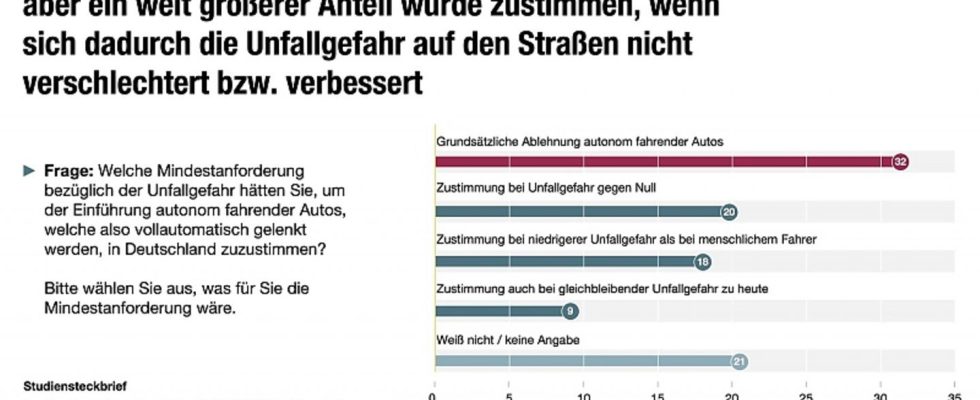Background: acceptance of autonomous driving in Germany
High bar
HUK survey autonomous driving result 1
© press-inform – the press office
It will be some time before autonomously driving cars roll on German roads. Skepticism is still great: almost a third of Germans reject robot cars in general – although fewer women give a thumbs-up than men.
Mid-August is an important milestone on the way to the robo car. Because then California’s regulatory authority will decide on the full approval of the autonomous vehicles tested in the US state Cars from General Motors subsidiary Cruise and Alphabet subsidiary Waymo. Tesla is not in the raffle yet. With good reason: The autopilot that Elon Musk promoted only bears his name on paper. The Californian car manufacturer only recently had to admit that purely camera-based autonomous driving would not lead to the goal.
A first step after the euphoria surrounding robotic driving had quickly evaporated. Originally, individual car manufacturers had set the goal of putting autonomous cars on the road as early as 2021. In the meantime, the reality is different: Reports of autonomous cars simply standing in the middle of the street have not necessarily contributed to the good reputation of the future-oriented technology. What is certain is that autonomous driving will come. It is also clear that it will be quite a while before the robo-cars roll everywhere (level 5). Level 3, i.e. highly automated driving under strictly defined conditions and up to a maximum speed of 130 km/h, is already permitted in Germany. The jump to Level 4 is big, because then the car can cover distances without the driver having to intervene immediately, since the vehicle must be able to come to a safe stop on its own – for example on the hard shoulder.
What about the acceptance of the Germans with regard to autonomous driving? The HUK-Coburg insurance company asked 4,042 people aged 16 and over what they think of autonomously driving cars: 32 percent completely reject robo-cars, only nine percent vote for autonomous vehicles if the risk of an accident is as high as it is the case in current traffic. If the risk of a collision is lower than that of a human driver, 18 percent give the thumbs up. One in five nods in agreement when the self-driving cars follow the traffic almost perfectly, meaning the risk of an accident is close to zero. So the bar is set high. But the car manufacturers will only send optimally functioning robotic vehicles onto the road out of self-interest. Because in the event of an accident caused by the technology, the manufacturer is initially in need of an explanation. Not to mention the disastrous external impact.
A look at the age structure of people who generally reject autonomously driving cars shows that the proportion of people over 55 is noticeably high at 43 percent. For younger people it is only 24 percent. This raises the question of whether there are local differences or are the skeptics evenly distributed across the Federal Republic? Schleswig-Holstein is the stronghold of robo-car nihilists. There, 40 percent of those surveyed “generally reject” autonomous driving. Distrust is similarly pronounced in Brandenburg (39 percent) and Saxony (36 percent). The biggest supporters come from the Saarland, where only 24 percent are against autonomous driving, followed by Bavaria with 29 percent. Interestingly, men are much more open to automatically operating cars than women: 55 percent are in favor of autonomous driving provided that the risk of accidents does not worsen. For women, on the other hand, it is only 39 percent.
It gets interesting when you break down the background of the autonomous skeptics. It’s hardly surprising that electric car owners are big advocates of the new technology. Only 17 percent reject autonomous driving in general. As soon as a conventional drive is up and running under the bonnet, distrust of robo-cars increases, with 36 percent each rejecting the driver of a diesel or petrol car. That is four percent more than the national average (32 percent). Interestingly, the denial of autonomous driving among frequent drivers who cover more than 20,000 kilometers per year is not as pronounced at 34 percent as it is among pilots who only cover 1,000 kilometers within twelve months (36 percent). People who do not have a driver’s license would benefit from self-driving vehicles. It is therefore not surprising that only 24 percent of those surveyed without a driver’s license reject autonomous driving without any ifs or buts.

